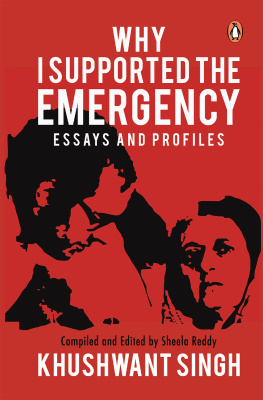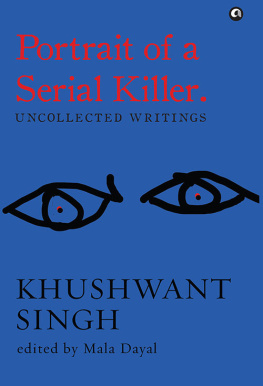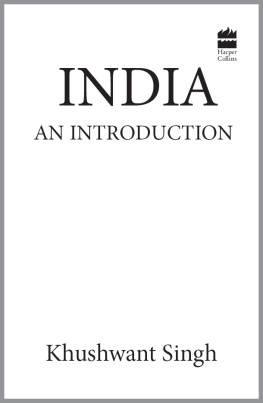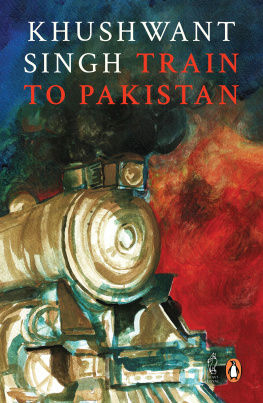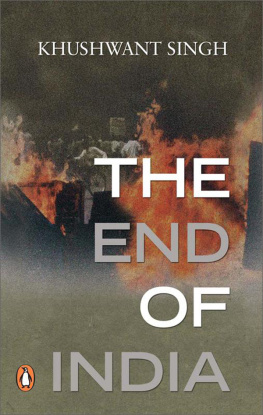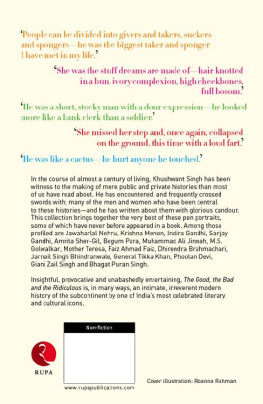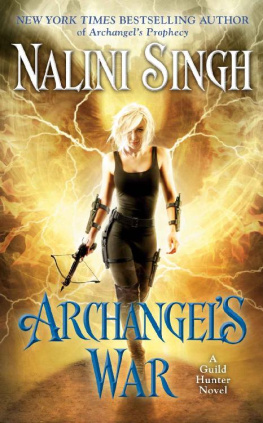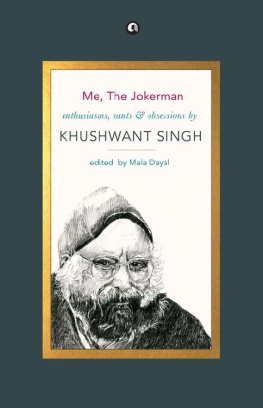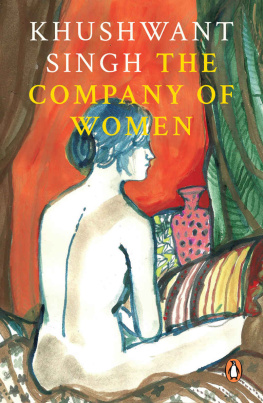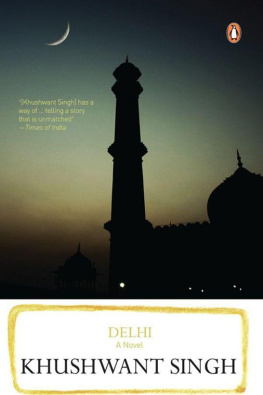Khushwant Singh - Why I Supported the Emergency
Here you can read online Khushwant Singh - Why I Supported the Emergency full text of the book (entire story) in english for free. Download pdf and epub, get meaning, cover and reviews about this ebook. year: 2013, publisher: Penguin Books Ltd, genre: Detective and thriller. Description of the work, (preface) as well as reviews are available. Best literature library LitArk.com created for fans of good reading and offers a wide selection of genres:
Romance novel
Science fiction
Adventure
Detective
Science
History
Home and family
Prose
Art
Politics
Computer
Non-fiction
Religion
Business
Children
Humor
Choose a favorite category and find really read worthwhile books. Enjoy immersion in the world of imagination, feel the emotions of the characters or learn something new for yourself, make an fascinating discovery.
- Book:Why I Supported the Emergency
- Author:
- Publisher:Penguin Books Ltd
- Genre:
- Year:2013
- Rating:5 / 5
- Favourites:Add to favourites
- Your mark:
- 100
- 1
- 2
- 3
- 4
- 5
Why I Supported the Emergency: summary, description and annotation
We offer to read an annotation, description, summary or preface (depends on what the author of the book "Why I Supported the Emergency" wrote himself). If you haven't found the necessary information about the book — write in the comments, we will try to find it.
Why I Supported the Emergency — read online for free the complete book (whole text) full work
Below is the text of the book, divided by pages. System saving the place of the last page read, allows you to conveniently read the book "Why I Supported the Emergency" online for free, without having to search again every time where you left off. Put a bookmark, and you can go to the page where you finished reading at any time.
Font size:
Interval:
Bookmark:




Let the conversation begin...
Follow the Penguin Twitter.com@PenguinIndia
Keep up-to-date with all our stories YouTube.com/PenguinIndia
Like Penguin Books on Facebook.com/PenguinIndia
Find out more about the author and
discover more stories like this at penguinbooksindia.com

Compiled and Edited by Sheela Reddy


UK | Canada | Ireland | Australia
New Zealand | India | South Africa
Penguin Books is part of the Penguin Random House group of companies whose addresses can be found at global.penguinrandomhouse.com.

This collection published 2009
Copyright Khushwant Singh 2009
The moral right of the author has been asserted
Jacket images Nitesh Mohanty
ISBN: 978-0-143-42552-6
This digital edition published in 2015.
e-ISBN: 978-8-184-75241-0
This book is sold subject to the condition that it shall not, by way of trade or otherwise, be lent, resold, hired out, or otherwise circulated without the publishers prior consent in any form of binding or cover other than that in which it is published and without a similar condition including this condition being imposed on the subsequent purchaser.
There are so many people I want to thank for making this book possible: Vinod Mehta, editor of Outlook, for his generosity and for turning a blind eye as I scurried to meet deadlines not of his making; Diya Kar Hazra, for making it look so easy, and Mekhala Moorthy for her painstaking editing; Sashidharan Kollery for his moral support and for cheerfully rushing to my aid to retrieve and send the manuscript back and forth; Lachhman Das for meticulously filing away years of newspaper clippings; and not least, Penguins trusty Auto Ravi for ferrying mountains of pages from my office to Penguins.
PENGUIN BOOKS
Khushwant Singh was Indias best-known writer and columnist. He was founder-editor of Yojana and editor of the Illustrated Weekly of India, the National Herald and Hindustan Times. He authored classics such as Train to Pakistan, I Shall Not Hear the Nightingale and Delhi. His last novel, The Sunset Club, written when he was ninety-five, was published by Penguin Books in 2010. His non-fiction includes the classic two-volume A History of the Sikhs, a number of translations and works on Sikh religion and culture, Delhi, nature, current affairs and Urdu poetry. His autobiography, Truth, Love and a Little Malice, was published by Penguin Books in 2002.
Khushwant Singh was a member of Parliament from 1980 to 1986. He was awarded the Padma Bhushan in 1974 but returned the decoration in 1984 in protest against the storming of the Golden Temple in Amritsar by the Indian Army. In 2007, he was awarded the Padma Vibhushan.
Among the other awards he received were the Punjab Ratan, the Sulabh International award for the most honest Indian of the year, and honorary doctorates from several universities.
Khushwant Singh passed away in 2014 at the age of ninety-nine.
Sheela Reddy has been a journalist for over thirty years and knew Khuswant Singh for almost as long. She was the books editor of the leading news magazine Outlook, writing extensively on books, authors and the publishing business. Her writing has appeared in literary magazines and in several anthologies, including Penguins First Proof and Chasing the Good Life.
Fourteen years ago, when I was a reporter for the Asian Age, my editor, M.J. Akbar, sent me to interview Khushwant Singh. I had met Khushwant once years ago when I was trying to make a precarious living as a young freelance journalist. At that time I had duly pounded the pavements of Bahadur Shah Zafar Marg, better known in my circle of freshly arrived immigrants to Delhi as the Fleet Street of India. The first editors door that I could get past was that of an unknown tabloid called the Sun. I had an article with meon Barbara Cartlands visit to Hyderabadthat I had written and typed out. It was accepted and the editor asked me if I could also interview Khushwant Singh for the Sun. I had no idea why he wanted a feature on Khushwant Singh after Barbara Cartland, but I accepted the assignment with alacrity.
Khushwant was certainly easier to meet than Barbara Cartland, whose gatekeepers included a five-star hotel staff, the organizers of her event in Hyderabad and finally her husbands cold voice on the phone. Khushwants number was listed in the telephone directory and he answered the phone himself. Come at four oclock today, he said briskly, without even asking which newspaper I was reporting for. It brought him down a little in my young rank-conscious eyes. He was already a legend by then, churning out his two weekly columns for over a dozen English and fifteen language dailies across the country. And these columns were collected into books almost as fast as he wrote them. Then, as now, you couldnt go to a single railway station, no matter how small, and not find a paperback written by him at the A.H. Wheeler stall. Another reason for my disdain was that my father, a retired railway engineer who read only newspapers, the Illustrated Weekly before it folded up and Perry Mason thrillers by Erle Stanley Gardner, read him religiously every week.
Khushwant opened the door himself, a barefoot, sloppy, bespectacled sardar with a beard dyed jet black, in shorts and a T-shirt that was once white but was now stained with what looked like ketchup but turned out to be the Pan Parag he chewed all day. He led me into his little den, which made me a little nervous: he had a reputation and I couldnt see if anyone else was in the house besides him. All four walls of the study were lined with books. Just as we settled down, he in a comfortably worn black leather sofa, his bare feet up on a moda, a servant arrived with a tray carrying two large mugs of tea and two or three generous slices of fruit cake. The cake was for me, Khushwant said, and deftly led me into my interview without wasting time on further preambles. Ive forgotten now what the interview was about, but I recall being lulled by his avuncular kindness into asking questions I wouldnt have dared to ask anyone else of his age and stature. He answered in very simple, plain words, with an openness I had rarely encountered, considering each question I put to him with a gravity that made me feel as if I was a veteran journalist instead of a cub reporter for an unknown tabloid, which, incidentally, closed down very soon after this incident. He waited till Id finished, before starting his own grilling: where was I from? Was I single or married? What did my parents do? And my husband? But his probing was very skilful, disguised under the cover of many amusing anecdotes and stories about people whom Id vaguely heard of even though they were from Hyderabad, the city where I grew up. I got the impression even then that behind his benign gaze, he didnt miss a thing. And I left feeling flattered by his rapt attention. I was convinced I had made a lasting impression on him.
Font size:
Interval:
Bookmark:
Similar books «Why I Supported the Emergency»
Look at similar books to Why I Supported the Emergency. We have selected literature similar in name and meaning in the hope of providing readers with more options to find new, interesting, not yet read works.
Discussion, reviews of the book Why I Supported the Emergency and just readers' own opinions. Leave your comments, write what you think about the work, its meaning or the main characters. Specify what exactly you liked and what you didn't like, and why you think so.

